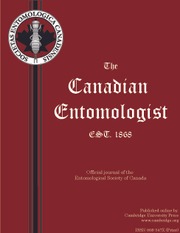No CrossRef data available.
Article contents
A NOTE ON VIRAZOLE AS A SYSTEMIC STERILANT FOR APHIDS (APHIDIDAE)
Published online by Cambridge University Press: 31 May 2012
Extract
A synthetic nucleoside analogue, 1-β-D-ribofuranosyl-1,2,4,-triazole-3-carboxamide (known as Virazole or Ribavirin), has been shown to inhibit the multiplication of at least 25 DNA- and RNA-containing human viruses (Sidwell et al. 1974), and to inhibit or eliminate several plant viruses (Fazio et al. 1978; Hansen 1979; Lerch 1977; Shepard 1977). We report here a significant reduction in the number of nymphs produced by aphids living on plants treated with sublethal doses of Virazole, and the stunting of treated plants at higher concentrations.
- Type
- Articles
- Information
- Copyright
- Copyright © Entomological Society of Canada 1980


